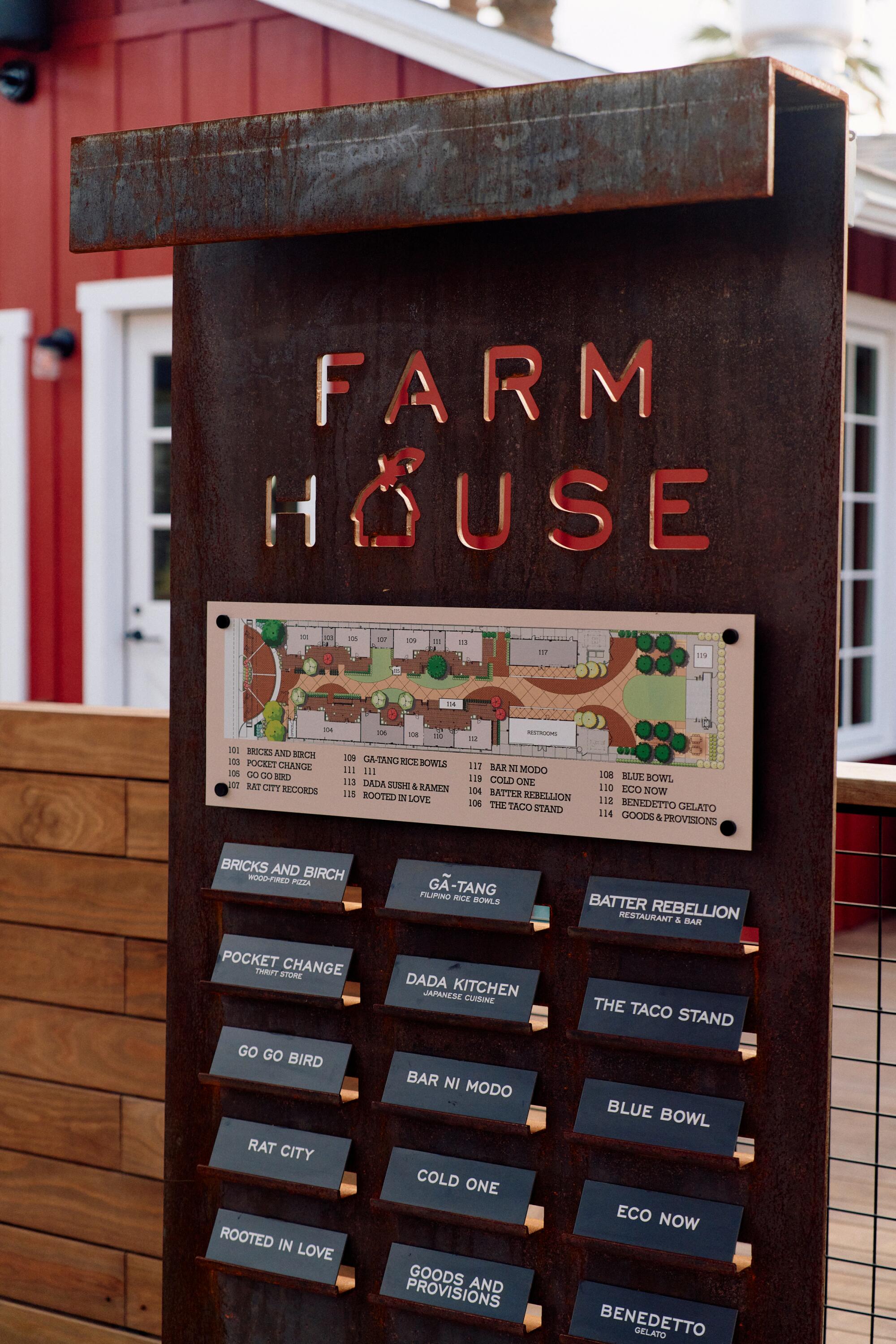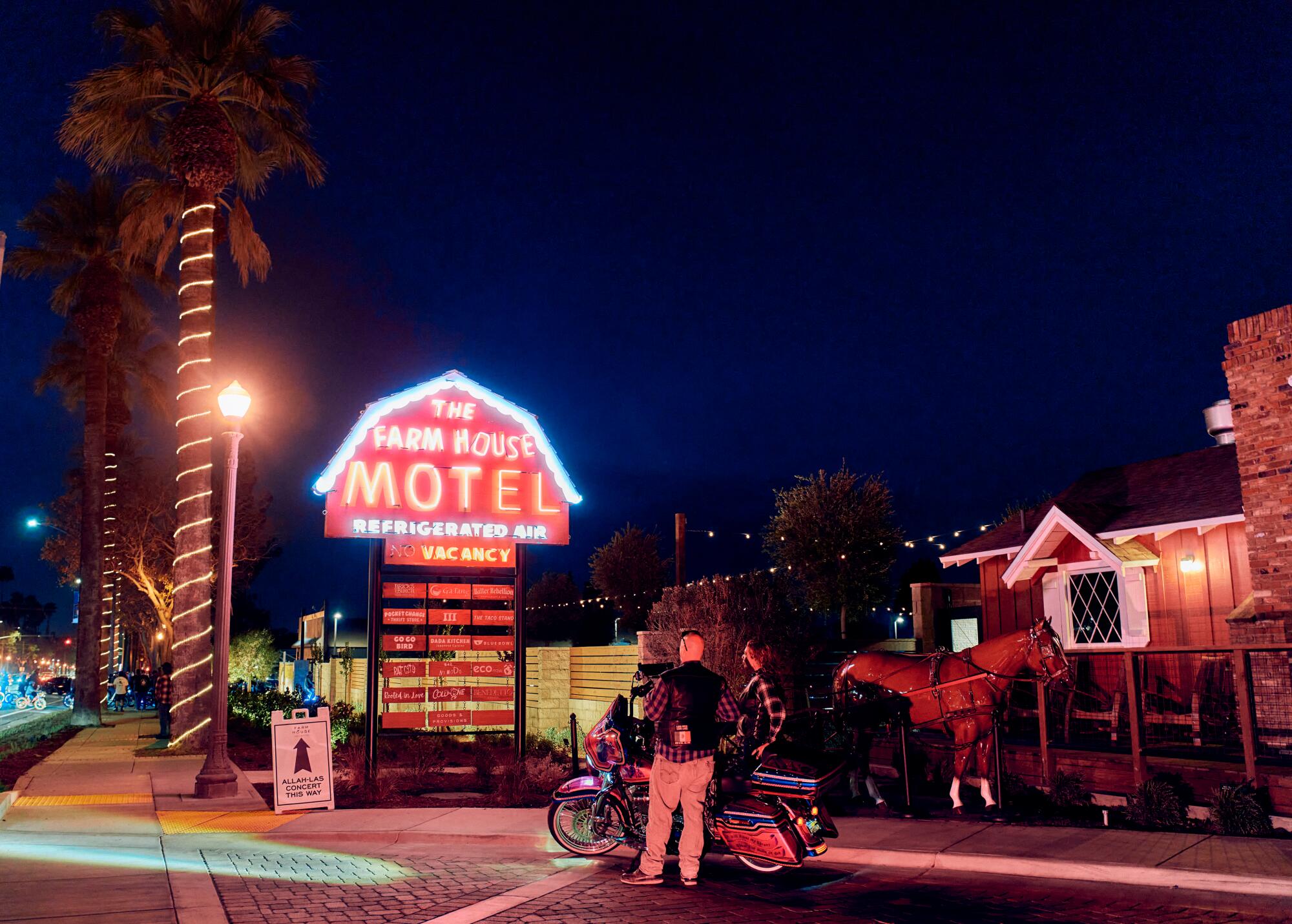There were no vacancies beneath the old neon Farm House Motel sign last Saturday — no guest rooms at all, in fact. But the 1950s Riverside property, now known as the Farm House Collective, was busier than it has been for decades.
By 10 a.m., when a ribbon-cutting marked the Farm House’s rebirth as a mini-mall, food hall and music venue, the parking lot was full.
The motel’s old carports next to the guest rooms were enclosed and became indoor retail spaces.
(David Fouts / For The Times)
By midday, Steve Elliott of Smokey Steve’s barbecue had sold about 160 pounds of meat from his pop-up booth and there was a long line for $6 tacos at Bar Ni Modo.
By sundown, an audience of several hundred had gathered to see L.A. indie rock band Allah-Las take the outdoor stage.
Until this redesign, the Farm House Motel “was a homeless encampment for a long time,” said James Elliott, 29, standing by the pop-up market at the grand opening event. “As long as you have the vision, you can change anything.”

The Farm House Collective hasn’t reached full strength yet; about half of its tenants are yet to open.
(David Fouts / For The Times)
The renovation project — which has included more than $4 million in design and construction work — has held onto the old motel’s rural theme, the red buildings trimmed to evoke barns, a vintage Ford F-100 truck parked alongside the walkway. Next to the repainted, rewired Farm House sign stand a fiberglass horse and buggy, contributed by the Camou family, owners of the motel for decades.
As midcentury motels fade into history, some move upscale and become boutique hotels, some are leveled or acquired by government agencies as transitional housing. And a rare few in Southern California — including the Farm House, Roy’s Motel in Amboy and the Pink Motel in Sun Valley — have taken on new commercial afterlives that don’t involve sleepovers but do evoke the past. At each location, a vintage sign flickers, inviting guests to step into a throwback American scene or capture it with a camera.
The most dramatic nonprofit example of motel rebirth may be the Lorraine Motel in Memphis, Tenn., which was the site of the Rev. Martin Luther King Jr.’s 1968 assassination and reopened in 1991 as the National Civil Rights Museum. Recent commercial examples include Fergusons Downtown in Las Vegas, a 1940s motel reborn as a food and retail center in 2019. A shopping center project at the former La Hacienda Motel in Albuquerque is due to open this year.
“There are a lot of these midcentury buildings that still have possibilities if people want to get in there and save them,” said Beverly Bailey, co-founder and development director of the Farm House project. “They’re jewels, and it brings life to a city.”
Roy’s of Amboy, a desert icon
In the desert outpost of Amboy, along Route 66 about 210 miles east of Los Angeles, a small team of workers sustains California’s most iconic nonfunctional lodging: Roy’s Motel and Cafe. Its 1959 sign may be misleading (neither the motel nor the cafe has been open for at least 30 years), but the crew sells gas, souvenirs and snacks and sometimes hosts filming and special events.
Every day, Amboy manager Ken Large said, desert rats, lovers of Route 66 and many travelers on their way from Las Vegas to Joshua Tree converge beneath the red, blue, black and yellow sign, which rises 50 feet and is lighted nightly. About 80% of those who stop, Large said, have come from Europe.
“It’s shocking how many tattoos I’ve seen of that sign,” Large said. “I bet I’ve seen a thousand.”
The owner of Roy’s (and all of Amboy) is Kyle Okura, whose late father, entrepreneur and philanthropist Albert Okura, bought it in 2003. He relighted the sign in 2019, ending more than 30 years of darkness. The younger Okura and company have been upgrading infrastructure steadily and would like to reopen the motel — perhaps even get the six cottages open in time for the Route 66 centennial in 2026.
But as Large acknowledges, that “might be a stretch.” The groundwater in Amboy is about 10 times saltier than the sea, Large said, and for years, all drinking water has been trucked in. To grow substantially, Large said, Roy’s and Amboy need easier access to potable water, probably through a groundwater purification process.
For now the cottages stand idle by the glass-walled motel office and its rakishly tilted roof. The office includes an ancient Zenith TV, a typewriter, a grand piano and the switches that light up the sign — all the makings of a stage set for a play in the spirit of Sam Shepard or Samuel Beckett.
If there are travelers on hand at sunset, Roy’s assistant manager Nicole Rachel said, “We’ll invite them to come in and light the sign themselves. I’ve had people in tears.”
“I’m fascinated with this part of the country,” said Chris Birdsall, a 51-year-old trucker from Omaha who lingered as sunset neared one recent night. “I want to see the sign lit up. That big arrow. … It’s almost got an extraterrestrial connection.”
A few minutes later, Rachel invited Birdsall in to throw the switch, and the sign blinked to life over the windswept desert.
In Sun Valley, movies and midcentury grit
At the Pink Motel on San Fernando Road in Sun Valley, the last overnight guest checked out about 10 years ago. But the film crews keep coming.
The family-run 3.5-acre property, which includes a 20-room motel and the closed-to-the-public Cadillac Jacks Cafe, has entered a very L.A. afterlife as a filming and special event location. Instead of cash-strapped travelers and dangerous liaisons, the motel hosts music videos, dog shows, wedding photos, car club meetings, social media gatherings and skateboarding events in its empty pool.
To be sure, this is not what Maximillian Joseph Thomulka and his wife, Gladys Thomulka, imagined when they built and opened the place in the aftermath of World War II.
“It was built in 1946. But the vibe is like 1955, ’56,” said co-owner Tonya Thomulka, granddaughter of the founders, in early 2025. (Subsequent messages were not returned.)
The cafe was built in 1949, the pool in 1959, when San Fernando Road was part of Highway 99, seething with drivers heading to and from the San Joaquin Valley. Then came Interstate 5. The neighborhood went south.
By the late 1970s, the founders’ son, Monty Thomulka, was running the motel, restoring old cars and just beginning to rent the location out occasionally. In 1986, the restaurant closed. Then in 2015, the year Monty Thomulka died, the family stopped renting rooms overnight.
But production crews, lured by the midcentury style and gritty vibe, kept coming. Among the motel’s television credits: episodes of “Law & Order,” “The Incredible Hulk,” “Dexter,” “The O.C.” and “GLOW” (2017-19). Among its movie credits: “Drive,” “Grease 2,” “Pink Motel” and Stacy Peralta’s “The Search for Animal Chin,” a 1987 skateboarding film that features a teenage Tony Hawk.
Nowadays the property (not open to the public, but partially visible from the street) is full of throwback visuals, including its sign, the restaurant and seven rooms outfitted in ’50s and ’60s styles. The Los Angeles Conservancy calls it “a wonderful example of the mid-century roadside commercial resources that are so swiftly disappearing from the landscape.”
New life at Riverside’s Farm House

On the calendar of events at Farm House Collective: pop-up markets, Coachella watch parties and a gospel brunch.
(David Fouts / For The Times)
Before 1969, University Avenue in Riverside was a busy highway, part of U.S. 395, making the Farm House Motel a prime stop for travelers. But as that traffic moved to State Routes 60 and 91, commerce faded along that stretch of University Avenue, despite the growth of UC Riverside nearby. The neighborhood faded further, locals say, after the 1989 closing of nearby Riverside International Raceway (now the Moreno Valley Mall). Farm House Motel shut down in 2007, and a year later, the property passed to city ownership.
The Baileys, whose Perris-based family business, Stronghold Engineering, has been doing electrical, design and construction work for more than 30 years, bought the old motel from the city in 2018. Under that deal, the family paid the city $210,000 for the 1-acre Farm House property, which “we thought at the time was a great buy,” said Beverly Bailey.

The Farm House Collective on its opening day on Saturday, March 29, 2025.
(David Fouts / For The Times)
The family hired the Orange County consulting firm LAB Holding, which has worked on retails projects including the LAB Anti-Mall, the Camp and Anaheim Packing District (housed in a historic building complex). The old carports next to the guest rooms were enclosed and became indoor retail spaces — an acai bowl eatery, plant shop, artisan boutique and other spots have opened, with more to come.
An outdoor stage, which stands where the motel swimming pool was, is flanked by 10 elm trees and assorted kid-friendly games. The Baileys plan one or two music performances per month, perhaps more later, and the stage will also offer movie screenings, TV sports viewing and other events.
Not every motel is a strong candidate for a nonlodging afterlife, as developers elsewhere have learned the hard way. But with a university handy, local leaders in support and an encouraging start, several locals said the Farm House seems suited for the challenge.
“It’s a super cool place that you can just chill at,” said Amy Martinez, who grew up in Riverside, moved to Upland and returned to see the opening with her family. The neighborhood has come a long way, she said, and “to see the rest of the shops open up, that’ll be nice.”

The Farm House Collective’s opening March 29 marked the end of a long idle spell after closure of Riverside’s Farm House Motel.
(David Fouts / For The Times)
This story originally appeared on LA Times

